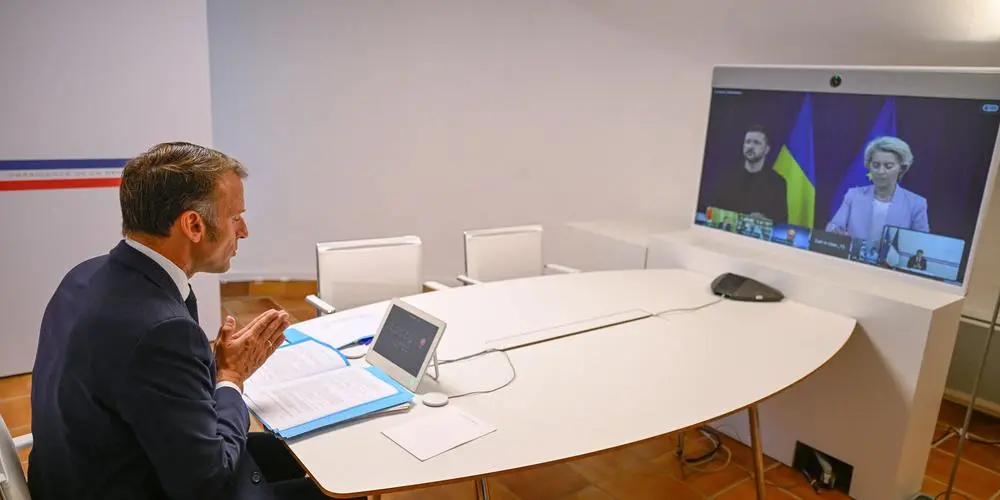
Macron confronts Putin’s peace proposal, calling for justice and sovereignty for Ukraine
Macron Defiant Stand – As global tensions mount and diplomatic fault lines deepen, French President Emmanuel Macron has emerged as one of the most vocal critics of Russian President Vladimir Putin’s approach to peace negotiations. Ahead of a high-stakes summit in Washington, Macron’s pointed remarks and strategic positioning signal a shift in Europe’s role in shaping the outcome of the war in Ukraine. With European leaders rallying behind Ukrainian President Volodymyr Zelensky, the summit could mark a turning point or a diplomatic deadlock.
Here’s how Macron’s rhetoric and leadership are redefining the stakes.
Table of Contents
Macron’s Message: No Peace Without Justice
Speaking from Fort de Brégançon before departing for Washington, Macron didn’t mince words. He accused Putin of offering a “capitulation disguised as peace,” referring to Russia’s demands that Ukraine surrender parts of the Donbas region in exchange for a ceasefire. “There is only one state proposing a peace that amounts to surrender and that is Russia,” Macron declared, emphasizing that any resolution must respect international law and Ukraine’s sovereignty.
Macron’s comments came after the Alaska summit between Putin and U.S. President Donald Trump, which failed to produce a ceasefire. Trump’s subsequent statements suggested a pivot toward a direct peace agreement, bypassing Ukraine’s immediate demands. Macron, however, insists that Ukraine must remain central to any negotiation, warning that theoretical guarantees are not enough: “The Ukrainians cannot accept vague promises, they need real, enforceable security.”
His stance has been echoed by other European leaders, including German Chancellor Friedrich Merz and European Commission President Ursula von der Leyen, who are joining Macron and Zelensky in Washington to press for a more robust and equitable peace framework.
The Stakes in Washington: Security, Sovereignty, and Solidarity
The summit in Washington is more than a diplomatic gathering it’s a test of Western unity. With Trump reportedly considering Putin’s proposal to freeze frontlines in exchange for territorial concessions, European leaders are scrambling to ensure that Ukraine’s interests aren’t side-lined.
Macron has outlined three key stakes for the summit:
- Security Guarantees: France and Britain have drafted a plan to deploy European troops in uncontested Ukrainian zones not as combatants, but as strategic symbols of solidarity.
- Territorial Integrity: Macron reiterated that only Ukraine can decide the fate of its borders, rejecting any external pressure to cede land.
- Long-Term Peace: The French president emphasized the need for a durable peace that prevents future aggression, not just a temporary halt in hostilities.
These goals reflect a broader European anxiety: that a rushed deal could embolden Russia and undermine the credibility of Western alliances.
Macron vs. Putin: A Clash of Visions
The rhetorical clash between Macron and Putin is more than political theatre, it’s a battle of ideologies. Putin’s strategy, according to Ukrainian intelligence, includes staged military victories and propaganda aimed at convincing Trump that Russia is winning on the ground. Macron, by contrast, is pushing for transparency and accountability.
“Peace cannot be built on illusions,” Macron said, referencing reports of Russian troops conducting “suicidal flag-planting missions” to fabricate territorial gains. These tactics, he argues, are designed to manipulate negotiations and pressure Ukraine into concessions.
Macron’s defiance is rooted in a broader European frustration with Putin’s tactics and Trump’s unpredictable diplomacy. By taking a firm stand, Macron is positioning France not just as a mediator, but as a moral compass in the conflict.
Macron Defiant Stand & Europe’s Role: From Bystander to Power Broker
The Washington summit marks a shift in Europe’s diplomatic posture. No longer content to follow the U.S. lead, European leaders are asserting their influence. Macron’s leadership is emblematic of this transformation from reactive diplomacy to proactive strategy.
The “Coalition of the Willing,” a group of European nations supporting Ukraine, has become a key player in shaping the peace process. Their presence in Washington sends a clear message: Europe will not rubber-stamp a deal that compromises Ukraine’s future.
Macron’s challenge now is to translate rhetoric into results. Can he persuade Trump to adopt a more balanced approach? Can Europe present a united front? And most importantly, can Ukraine emerge from this summit with its sovereignty intact?
Final Thought:
Macron’s attack on Putin and his bold vision for peace have elevated the stakes of the Washington summit. In a world teetering between diplomacy and discord, France’s president is betting that courage, clarity, and conviction can still shape history.
Trump Warning to Putin: A New Chapter in the Russia-Ukraine Conflict